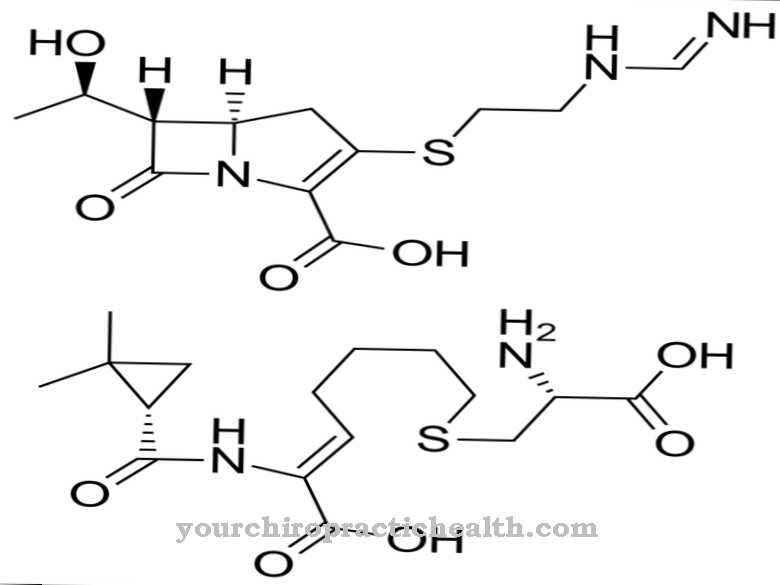Serotonin antagonists are drugs that block serotonin receptors and thus weaken or completely cancel the effects of serotonin. Depending on the receptor affinity, the individual serotonin antagonists have different effects.
What is a serotonin antagonist?

Due to their chemical properties, serotonin antagonists can bind to cell receptors that are actually intended for the neurotransmitter or the hormone serotonin. Serotonin antagonists are also called Serotonin agonists designated.
The individual agonists react selectively. They only bind to certain receptors. Since there are 14 types of serotonin receptors, there are just as many groups of serotonin antagonists. The effect differs from group to group. For example, the drugs are used to treat migraines or anxiety disorders.
Some serotonin antagonists are also antiemetics. These are effective against nausea and vomiting. Other representatives of the agonists are psychedelic and are abused as smoking drugs.
Pharmacological effect
Serotonin antagonists can bind to the serotonin receptors in the body. The tissue hormone serotonin mediates its physiological and pathological effects via the serotonin receptors.
Serotonin occurs, among other things, in the nervous system of the intestine, in the cardiovascular system, in the blood and in the central nervous system. The substance has many different effects in the body. It ensures both contraction and relaxation of the smooth muscles of the blood vessel walls, it affects blood clotting and takes on various sensory and motor functions in the gastrointestinal tract.
Just like serotonin itself, the receptors are also predominantly found in the central nervous system, in the cardiovascular system, in the blood and in the gastrointestinal tract. There are 14 different types of serotonin receptors in the human body. These are summarized in 7 groups and referred to as 5-HT1 to 5-HT7 receptors. Depending on the chemical structure, the serotonin antagonists bind to one or the other group of receptors. By binding, they block the receptor so that the serotonin can no longer dock on this receptor. This inhibits the effect of serotonin.
Medical application & use
5-HT3 receptor antagonists such as dolasetron, ondansetron or tropisetron block the vomiting center. The 5-HT3 receptors occur exclusively on central and peripheral neurons. Among other things, they are responsible for triggering the vomiting reflex. Serotonin antagonists from this group of active ingredients are used to treat cytostatic-induced vomiting. Nausea and vomiting are among the most common side effects of chemotherapy with cytostatics. If nausea and vomiting are due to irritation of the vagus nerve, administration of opioids or diseases of the inner ear, serotonin antagonists, however, have little effect.
5-HT2 antagonists are used to treat depression. Typical drugs from this group are pizotifen, ketanserin or trazodone. Methysergide is also one of the 5-HT2 antagonists. The drug is no longer approved because of severe side effects. The inhibition of the 5HT2a receptors has an anxiolytic effect. These drugs also block the presynaptic 5-HT1 autoreceptors. This in turn leads to an increased release of serotonin into the synaptic gap. A lack of serotonin in the synaptic cleft manifests itself in a lack of drive and a depressed mood. Indications for 5-HT2 antagonists are therefore depression, obsessive-compulsive disorder, panic attacks, post-traumatic stress disorder (PTSD) and borderline syndromes.
5-HT1 serotonin antagonists are used in migraine therapy. These serotonin antagonists include various triptans such as sumatriptan, rizatriptan or naratriptan. By blocking the receptor, the drugs cause a reduced release of inflammatory peptides. At the same time, they prevent the blood vessels in the brain from narrowing.
Group 5-HT1 serotonin antagonists are also used in the treatment of ADHD. Methylphenidates such as Ritalin® are subject to narcotics regulations. Various psychedelic active substances such as psilocybin, ergin or mescaline block the 5-HT2 receptors.
You can find your medication here
➔ Medicines to calm down and strengthen nervesRisks & side effects
The side effects of the individual serotonin antagonists can be very different. There are drugs that are very well tolerated. Other drugs cause side effects so severe that they have had to be taken off the market.
Typical adverse drug reactions include headache, fatigue, and dizziness. Disturbances of the gastrointestinal tract are often observed. These include diarrhea and constipation. Some of the patients also complain of insomnia. Flu-like symptoms can also occur. With long-term use, the liver values in the blood can increase.
Some serotonin antagonists cause severe attenuation. Patients feel tired and sleepy. Feelings can only be perceived muted. In some cases, people have an increased appetite. Other possible side effects of serotonin antagonists are visual disturbances, urinary retention, dry mucous membranes, cardiac arrhythmias or dizziness. Serotonin antagonists must not be used in known disorders of intestinal activity. Other contraindications are known hypersensitivity to the drugs and pregnancy.



























